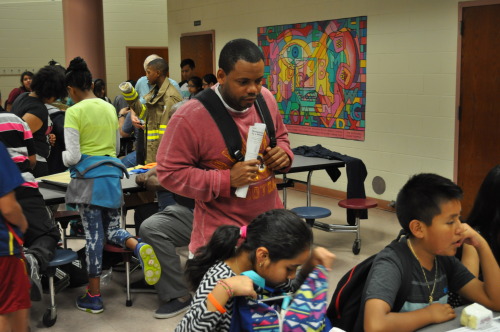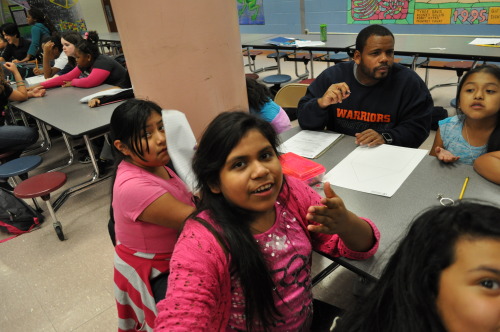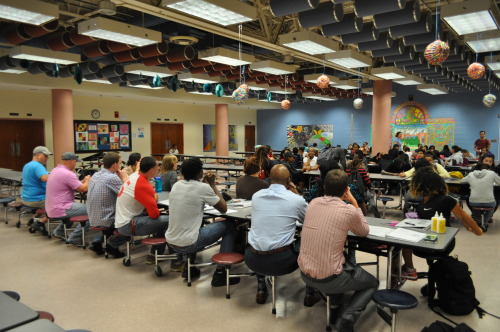John Hunt, a first year, Thursday night mentor at Boushall Achievement Center in Richmond, spoke to us about what mentoring means to him, and how he implements the curriculum. He has also volunteered as a member of the Mentor Advisory Council, in its first founding year.
Q: You could choose anywhere to volunteer. Why is this something that fits with you?
John: You know what it was? I’ll tell you like this: I look at the news, and I see the perception of a lot of African American males in this country and I don’t like it. And I guess that was my biggest thing; I wanted to try to changes people’s perceptions, and start with young people. If they could see a person who’s well spoken, who understands the importance of keeping their pants up, who understands the importance of education – and it’s something that I stress to my son – it’s fine if you want to be a football player or a basketball player, but what are you going to do after that? So start working on what you’re going to do after that so after your done, you actually have something to fall back on. That’s my thing as being an African American is pushing education, and not so much of sports. That really was my goal in becoming a mentor: being a positive role model for the next generation up, because I know if I didn’t have that positive role model in my life there is no telling what road my life would have went down.
Q: Did you have a mentor when you grew up?
John: Yeah, my dad. He was an army guy. He spent 8 years in the army, and he was really, really hard on me. I didn’t understand it until I became a man and I understood why my dad was like that. His biggest thing as I was growing up was that you have to pick yourself up. When there is adversity you have to be able to pick yourself up because a lot of times there’s not going to be anybody there. That was probably one of the biggest learning lessons I ever got and just in case you didn’t know I am going to retire from the army…
Q: Congratulations…
John: I have 20 years in April of 2016.
Q: …Your father must be very proud.
John: Well unfortunately he passed away in 2000…
Q: I’m so sorry.
John: …Yeah, but you know he still echoes in my head and I see him in the mirror because we look just alike so you know, he’s my biggest influence.
Q: Going back to what you said earlier, do you feel like the African American scholars at Boushall are getting that reinforcement of education?
John: Yeah, I think that they are, I hope that they are because I believe in leading by example. I figure if they see me here preaching about education, preparing my power point slides, telling the importance of education while still talking about sports and other things…I feel that doing, instead of telling should be able to allow me to be setting the example.

Q: One challenge Higher Achievement and other mentoring nonprofits face is finding mentors of color. What do you feel is the best way to increase diversity?
John: I think you guys going to ECPI was a great idea. Also, going to military bases. Gaining access to Fort Lee – if you all were able to do that – there are a lot of really great people in the military that are just like me that want to volunteer, but they just don’t know how. As soon as we know how, and as soon as we know that we’re going to do something to give back to the community, they are going to be full speed ahead. Not only does it look good on the part of the army, but it also looks good for career progression. If you can sit there and say this is what I’m doing for my community – because a lot about being in the military is community service, you know that goes a long way. Everybody wins.
Q: I haven’t yet seen a moment where there are less than 8 or so scholars who are vying for your attention when you show up to center. What is something they have taught you, maybe something that also surprised you?
John: You know what, its how intelligent that they are. They – I don’t mean for this to sound bad or anything – but when I came and started mentoring, I thought that I was going to be mentoring kids that needed extra help and like I said, I don’t mean any disrespect, but that was my biggest surprise was their intelligence. One of my first lessons with Jayquan, I was asking everybody, “What’s a prototype?” and Jayquan … I don’t want to mess up the way that he said it but it was textbook! I asked if everyone heard what he said, and showed them the definition on the PowerPoint. Its impressive how intelligent all of these kids are and all you have to do – it’s like a plant – you give them a little bit of water and they’re just going to continue to grow.

Q: You mentioned earlier how you use a PowerPoint in your scholar group, which really takes your lessons to another level. With added work like that, is it hard to fit being a mentor with Higher Achievement in your schedule?
John: It is. It is, but I make it a point because they’re counting on me. So that’s it. Period. I have to make the time to do it. Right before I even came here I was finishing up my PowerPoint, because I’m a full time student at ECPI and I have four kids and two of them play sports. But still: there’s always time, there’s always time. Like I said, these kids are counting on me and I will not let them down. That’s one of the biggest things that Christopher said to me that really hit me. That week that I wasn’t here he told me, “Mr. John they really missed you”, I was like, and “I wish I could have been here…” but I had a military commitment. From there I don’t make any excuses. I am here for the cause, but that’s me as a military member. Once you dedicate yourself to something you see it all the way through.
Q: From the mentor training, how much to you feel was “learn on-the-job” to what was presented to you in late September?
John: I will say this: when I came to the sessions, it did give me a good overview with what I was going to have to do with the curriculum. To tell you the truth – I always bring everything back to my military experience – that’s really all that I need. I just need a format and a standard to stick to. Once I have that, I can play it by ear as far as to get the information out there. When I first saw the paper work I thought that there was no way I could teach kids this – not in the 5th grade. But I have it, and I know what I can do in order for me to be able to project it to them so that they can retain it. I think they’ve been doing really good because – I like to hit it three times – especially when it comes to the vocabulary: we say it, we see it, and then we say it again. By that time, it’s going to be able to stick. That was my biggest thing: applying my own teaching style. That’s what I’m doing with my PowerPoint’s now. Before I was doing over 40 slides on one and I was thinking, “Man I am killing them with this…”, and you know why because I was sticking too much to the script. The first time I was doing it I kept thinking that there is so much of an easier way for me to say this! That’s what I do now: these are the main points, these are the vocabulary words, and these are the main parts of the story we need to get.

Q: What’s something that you would tell to someone who is interested in mentoring?
John: If you are going to do it then make sure that you are ready to commit yourself for the entire time. I don’t think that there is anything worse than somebody coming and not finishing it out – and I understand that things happen – but if you do it, come at it full hearted. Come at it either 100% or not at all because the kids deserve it from you.
To learn more about becoming a Higher Achievement mentor, visit: higherachievement.org/volunteer.
